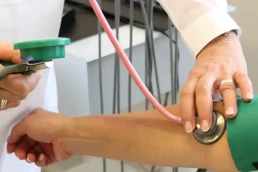There are many types of heart disease. I like to break them down into three categories, using the analogy of a house.
Clogged Arteries
First, there are plumbing problems with the heart. We have arteries that lie on the surface of the heart, and they supply blood to the heart muscle, much like the plumbing in your house. The pipes in your home can get clogged, and the arteries of your heart can get clogged.
The most common cause of heart artery blockage is cholesterol plaque. That is why high cholesterol and poor diet are risk factors for heart disease. If the blockage in the coronary arteries becomes severe, it can cause angina which is chest pain from the heart. This chest pain usually occurs with exercise, stress, or cold temperatures.
Cholesterol Plaque
If the cholesterol plaque is mild, it may not cause any symptoms, but mild, soft plaque is the most common type of plaque that causes a heart attack. The plaque becomes inflamed and unstable and ruptures, releasing substances into the artery which causes a blood clot to form. When this happens, blood flow is suddenly and significantly impaired to the heart muscle and can cause heart muscle damage if untreated.
Congestive Heart Failure
A second type of heart disease involves the walls and structures of the heart. This type of heart disease includes congestive heart failure, usually caused either by weakening of the heart muscle or stiffness of the heart muscle. Also included in this category are valvular heart diseases, where the heart valves don’t open or close properly, such as aortic stenosis and valvular regurgitation or leaky heart valves.
Electrical Problems
The third type of heart disease is electrical problems with the heart. Just like a house, your heart has an electrical system. Problems can arise when the heart has extra electrical pathways, extra heartbeats, or a tendency to have abnormal heart rhythms.
All types of heart problems can be serious. Risk factors for one kind of heart problem are often risk factors for the other types. So, controlling your risk factors decreases the risk of heart disease. Risk factor modification can be difficult for people to accomplish and maintain long-term on their own.
Consider joining my monthly membership or signing up for the Heart Health Foundations course or 1:1 health coaching. If you want to learn more, click here to schedule a free consultation.
If you’re tired of the “conventional medical treatment” for heart disease (medications, surgeries and more), then you’ll want to learn if preventive cardiology is a good fit for you.
- People with a strong family history of heart disease
- People with uncontrolled cardiac risk factors such as high cholesterol, high blood pressure, diabetes, sleep apnea, or obesity
- People who have had a previous heart attack or stroke
- People who have been diagnosed with a heart condition and need help understanding their illness and want to avoid further problems
- People who are at risk for heart disease due to age, ethnicity, or other factors
- People with abnormal advanced lipid panels
- People with abnormal cardiac imaging results
- People interested in taking a proactive approach to their health
Preventive Cardiology
Your Partner In Proactive, Natural Heart Health Care For Lifelong Wellness.
If you’re tired of the “conventional medical treatment” for heart disease (medications, surgeries, and more), then you’ll want to learn if preventive cardiology is a good fit for you.
Heart-Healthy Reading
Reach out to us with your questions via our contact form. We do our best to reply within 3 business days.
Yes, a monthly membership option is available for ongoing care.
The membership allows me to work closely with you to modify your cardiac risk factors.
Today’s technology makes it easy to see a telemedicine cardiologist.
We use a state-of-the-art video platform and digital technology to provide you with the same high-quality care you would receive in an in-person visit.
We follow a direct specialty care model, so the relationship is between the doctor and the patient, and no insurance is involved.
Often patients find that they save money paying the doctor directly without copays or deductibles.
Reach out to us with your questions via our contact form. We do our best to reply within 3 business days.
![]()
Dr Paeschke is wonderful! Having had a heart attack two years ago, it’s an amazing relief to have an ongoing relationship with a cardiologist who is responsive, patient and super knowledgeable.My prior cardiologist was the one who happened to be attending at the hospital. Perfectly competent but impossible to get any meaningful attention.It’s the opposite with Dr Paeschke and the way she’s set-up her practice. I feel very fortunate!
David, Nevada
![]()
![]()
I highly recommend Dr Tracy for all your cardiac issues. I found it very easy to get an appointment, no months long wait, both initially and for important follow up visits -which are enhanced through calls or on-line chats with her. It’s important to me that I communicate directly with my doctor, especially given the breadth and complexity of the issues that we discuss and this is always the case. While Dr Tracy’s focus is on prevention using the latest technology/devices/testing, my needs are immediate and I feel very confident they are met and we have the best plan going forward to address them.
Mark, Colorado
![]()
![]()
Dr. Paeschke is an excellent cardiologist. She is thorough and takes time with me as a patient. The appointment is not rushed and I feel very valued and cared for. I really like that she is close to me in Monument as well. I highly recommend Dr. Paeschke to anyone looking for a preventative cardiologist.
Sharon, Colorado
![]()
![]()
I have always appreciated Dr. Paeschke’s wisdom, care, and knowledge, ever since being referred to her in 2007. Since, I have found that her Heart Health Prevention and Wellness has helped me become my own advocate in all areas of health in my life provide for a defined lifestyle change. Thank you! Dr. Tracy
Abe, Colorado
![]()











